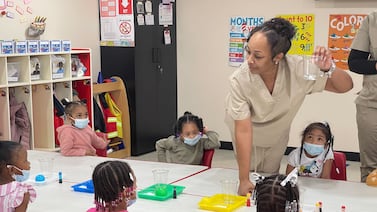Sign up for Chalkbeat Newark’s free newsletter to keep up with the city’s public school system.
Gov. Phil Murphy renewed his commitment to expanding universal pre-K in New Jersey and promised new plans to improve literacy rates among children across the state, according to education priorities he outlined during his annual State of State address.
In the Tuesday speech, Murphy hailed New Jersey as having “the best public education system in the United States,” a reputation he says he needs to maintain “by listening to our students, our educators, our parents, and putting their feedback into practice.”
More than 14,000 new preschool seats have been added across New Jersey, Murphy said, as he promised new initiatives that will focus on phonics instruction for younger students and the fundamentals of reading, such as sounding out letters and combining them into words.
“Increasing literacy rates makes New Jersey better,” Murphy said. “Because reading books is always better than banning books.”
After state test scores showed dismal drops in English language arts performance, local leaders and advocates called on state officials to create a plan to ensure children can read.
“It is simple. An emphasis on phonics and reading instruction is essential to the lifelong success of our children,” Murphy said.
His focus on literacy serves “as a desperately needed ray of sunshine for the many children across the state who need to learn how to read and write,” said Paula White, executive director of education advocacy group JerseyCAN.
Last year, JerseyCAN launched the New Jersey Legacy of Literacy (NJLL) Coalition, a statewide group that urged Murphy, the legislature, and the state’s department of education to adopt a plan that addresses literacy in every public school.
“No community in the Garden State is immune to our literacy problem, most especially our most vulnerable communities,” White added.
Become a Chalkbeat sponsor
New Jersey students need help with the basics of reading
Last year’s state test results showed small gains for most students in English language arts as post-pandemic academic recovery efforts continue.
Across the state, New Jersey’s third graders didn’t see improvement in reading last spring showing a pressing need to help young readers. Third graders’ reading proficiency statewide remained at 42% in 2023, the same as in 2022 — and 8 percentage points lower than the 50% rate in 2019.
Among all grade levels, 51.3% of students reached proficiency levels on the state’s English language arts test last spring, a 2.4% increase in reading proficiency over 2022. But scores continued to trail behind pre-pandemic levels, which reached 57.6% in 2019.
Spring 2023 test scores are the latest results from the state Student Learning Assessments, the second round of standardized tests given since the pandemic disrupted learning nearly four years ago. The data shows students are making progress in reading but also highlights the efforts school leaders must take to help students get back on grade level.
In Newark, the state’s largest school district, third graders trailed behind statewide averages. Only 19% of Newark third graders passed the English language arts tests for the second time in a row since 2022, underscoring the need to help some of the state’s most vulnerable students recover academically.
Local efforts to raise literacy levels ongoing
In Newark, reading and literacy have remained a point of concern for local leaders. Newark Mayor Ras Baraka declared an “urgent” literacy crisis throughout the city and launched a 10-point Youth Literacy Action plan that calls on local schools, parents, community partners, and programs to get young children reading and writing.
Last summer, more than 10,000 public school students were required to attend summer school – double the number from 2022 – with many requiring help with the basic ability to recognize letters and their sounds, handwriting, and reading comprehension.
The city’s public school leaders are also following the state’s lead in implementing phonics instruction to boost student achievement in reading.
This school year, Newark Public Schools created a plan to tackle difficulties in writing and English language arts that focuses on phonics instruction and explicit writing strategies and supports teachers’ knowledge of an evidence-based reading approach known as the science of reading as part of their English language arts curriculum this year.
The district said officials will monitor the effectiveness of the new curriculums and approaches mainly through students’ academic progress in reading, but also using state test scores and periodic assessments such as the Northwest Evaluation Association (NWEA) MAP growth assessment.
Become a Chalkbeat sponsor
“There is a great deal of work to be done, and there will be no quick fix,” said White, the JerseyCAN executive director. “The solutions outlined today energize a discourse to provide our children and our teachers with support to address this battle, and we pledge to work side by side with him to ensure we address this issue with the urgency it deserves.”
Jessie Gomez is a reporter for Chalkbeat Newark, covering public education in the city. Contact Jessie at jgomez@chalkbeat.org.







